Essay: Exploring Themes and Characters in Timothy Findley's The Wars
VerifiedAdded on 2022/09/26
|6
|1367
|25
Essay
AI Summary
This essay provides an analysis of Timothy Findley's novel, 'The Wars,' with a primary focus on the character of Robert Ross. The essay delves into Ross's experiences during World War I, highlighting his emotional turmoil, his hatred of social norms, and his internal conflicts stemming from the loss of his sister. A key aspect of the essay is the examination of Ross's actions, particularly his efforts to save horses from slaughter, and how these actions are perceived by literary critics. The essay explores the animal imagery used in the novel and its connection to Ross's compassion for animals. The essay also discusses Ross's relationships, including his connection with his father and his disregard for military protocol. Overall, the essay argues that Ross's actions were heroic because he prioritized human and animal ethics over military rules. The essay concludes that Ross's life was shattered from a young age, which led to his decision to stand with innocent living beings within nature, and to kill his fellow officer.
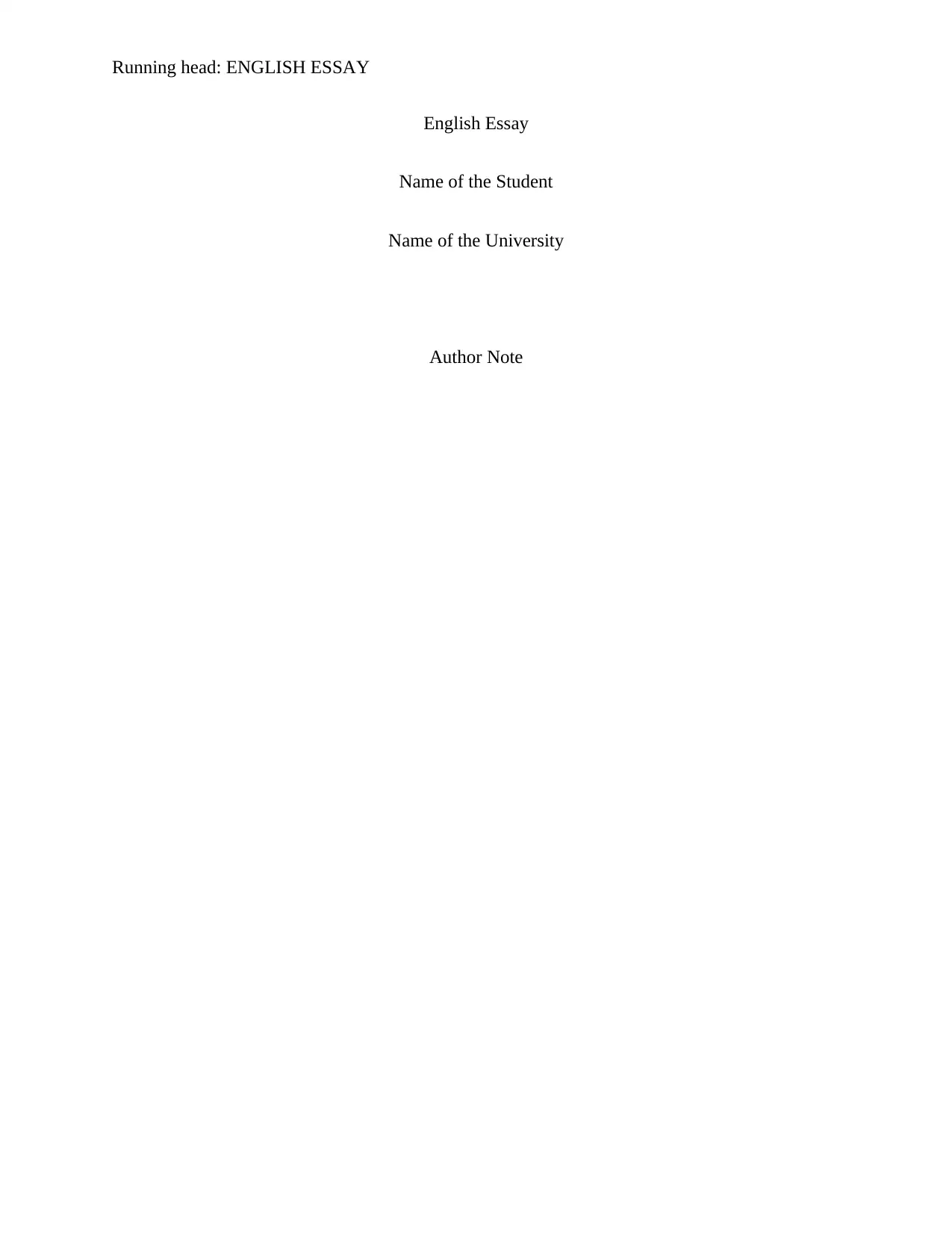
Running head: ENGLISH ESSAY
English Essay
Name of the Student
Name of the University
Author Note
English Essay
Name of the Student
Name of the University
Author Note
Paraphrase This Document
Need a fresh take? Get an instant paraphrase of this document with our AI Paraphraser
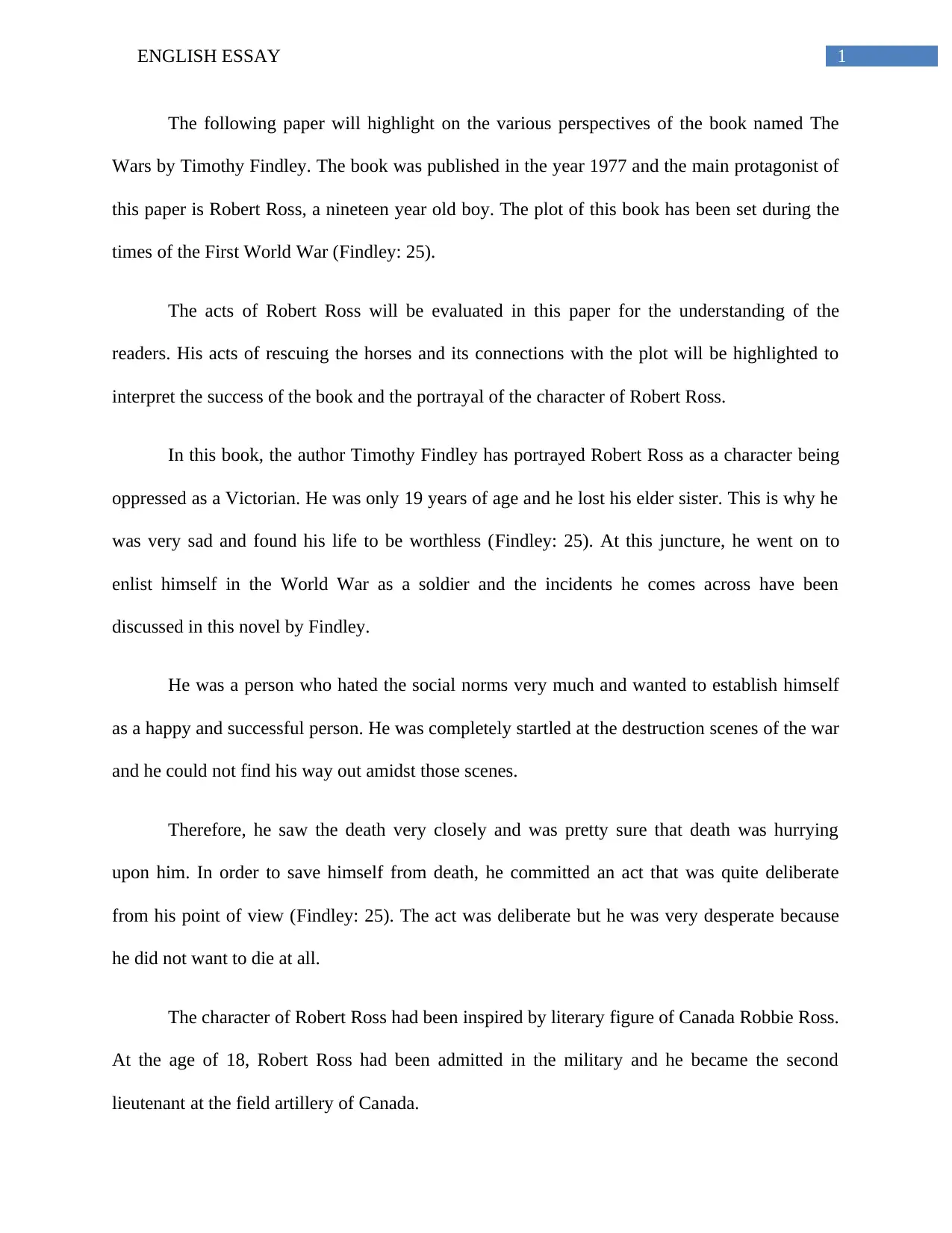
1ENGLISH ESSAY
The following paper will highlight on the various perspectives of the book named The
Wars by Timothy Findley. The book was published in the year 1977 and the main protagonist of
this paper is Robert Ross, a nineteen year old boy. The plot of this book has been set during the
times of the First World War (Findley: 25).
The acts of Robert Ross will be evaluated in this paper for the understanding of the
readers. His acts of rescuing the horses and its connections with the plot will be highlighted to
interpret the success of the book and the portrayal of the character of Robert Ross.
In this book, the author Timothy Findley has portrayed Robert Ross as a character being
oppressed as a Victorian. He was only 19 years of age and he lost his elder sister. This is why he
was very sad and found his life to be worthless (Findley: 25). At this juncture, he went on to
enlist himself in the World War as a soldier and the incidents he comes across have been
discussed in this novel by Findley.
He was a person who hated the social norms very much and wanted to establish himself
as a happy and successful person. He was completely startled at the destruction scenes of the war
and he could not find his way out amidst those scenes.
Therefore, he saw the death very closely and was pretty sure that death was hurrying
upon him. In order to save himself from death, he committed an act that was quite deliberate
from his point of view (Findley: 25). The act was deliberate but he was very desperate because
he did not want to die at all.
The character of Robert Ross had been inspired by literary figure of Canada Robbie Ross.
At the age of 18, Robert Ross had been admitted in the military and he became the second
lieutenant at the field artillery of Canada.
The following paper will highlight on the various perspectives of the book named The
Wars by Timothy Findley. The book was published in the year 1977 and the main protagonist of
this paper is Robert Ross, a nineteen year old boy. The plot of this book has been set during the
times of the First World War (Findley: 25).
The acts of Robert Ross will be evaluated in this paper for the understanding of the
readers. His acts of rescuing the horses and its connections with the plot will be highlighted to
interpret the success of the book and the portrayal of the character of Robert Ross.
In this book, the author Timothy Findley has portrayed Robert Ross as a character being
oppressed as a Victorian. He was only 19 years of age and he lost his elder sister. This is why he
was very sad and found his life to be worthless (Findley: 25). At this juncture, he went on to
enlist himself in the World War as a soldier and the incidents he comes across have been
discussed in this novel by Findley.
He was a person who hated the social norms very much and wanted to establish himself
as a happy and successful person. He was completely startled at the destruction scenes of the war
and he could not find his way out amidst those scenes.
Therefore, he saw the death very closely and was pretty sure that death was hurrying
upon him. In order to save himself from death, he committed an act that was quite deliberate
from his point of view (Findley: 25). The act was deliberate but he was very desperate because
he did not want to die at all.
The character of Robert Ross had been inspired by literary figure of Canada Robbie Ross.
At the age of 18, Robert Ross had been admitted in the military and he became the second
lieutenant at the field artillery of Canada.
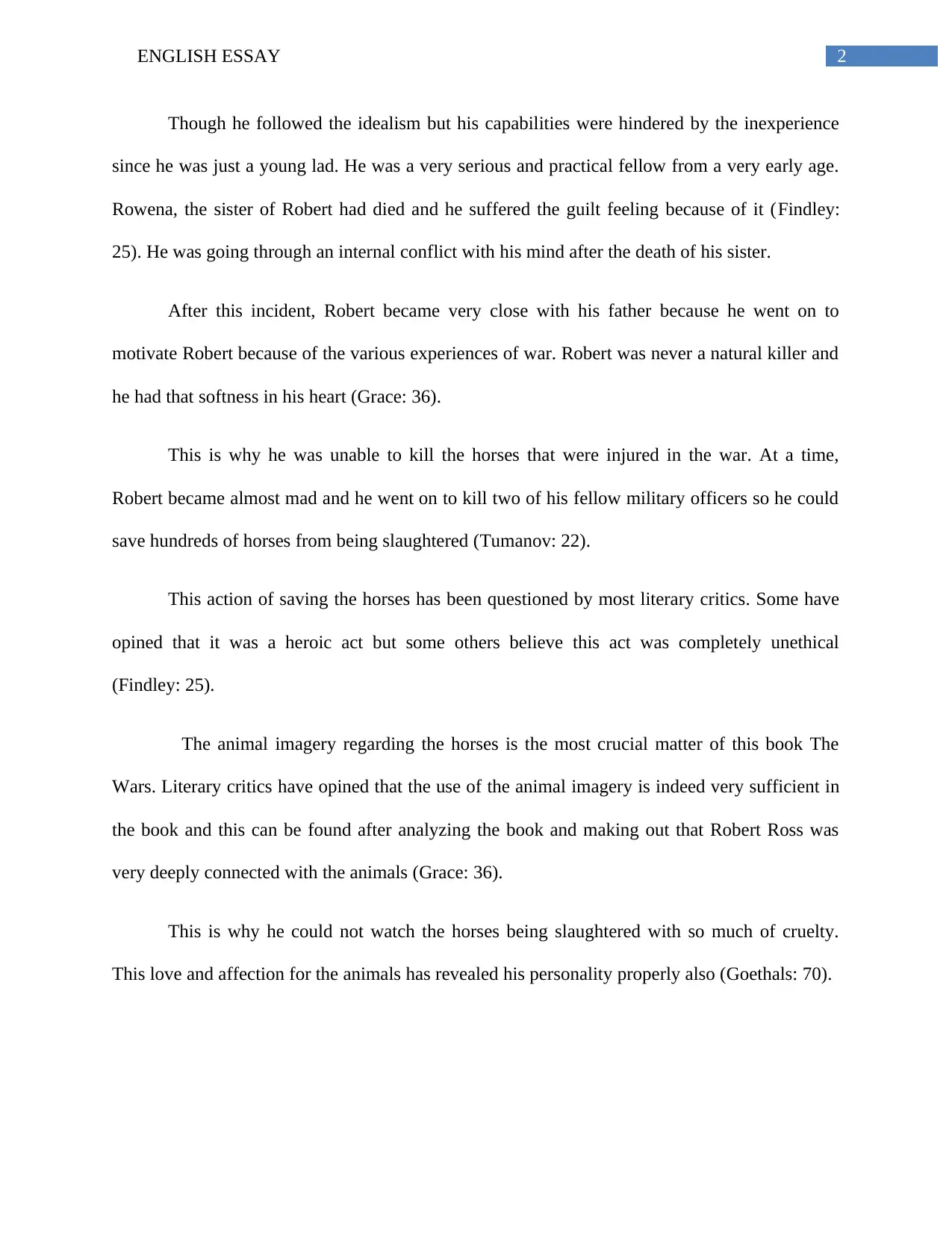
2ENGLISH ESSAY
Though he followed the idealism but his capabilities were hindered by the inexperience
since he was just a young lad. He was a very serious and practical fellow from a very early age.
Rowena, the sister of Robert had died and he suffered the guilt feeling because of it (Findley:
25). He was going through an internal conflict with his mind after the death of his sister.
After this incident, Robert became very close with his father because he went on to
motivate Robert because of the various experiences of war. Robert was never a natural killer and
he had that softness in his heart (Grace: 36).
This is why he was unable to kill the horses that were injured in the war. At a time,
Robert became almost mad and he went on to kill two of his fellow military officers so he could
save hundreds of horses from being slaughtered (Tumanov: 22).
This action of saving the horses has been questioned by most literary critics. Some have
opined that it was a heroic act but some others believe this act was completely unethical
(Findley: 25).
The animal imagery regarding the horses is the most crucial matter of this book The
Wars. Literary critics have opined that the use of the animal imagery is indeed very sufficient in
the book and this can be found after analyzing the book and making out that Robert Ross was
very deeply connected with the animals (Grace: 36).
This is why he could not watch the horses being slaughtered with so much of cruelty.
This love and affection for the animals has revealed his personality properly also (Goethals: 70).
Though he followed the idealism but his capabilities were hindered by the inexperience
since he was just a young lad. He was a very serious and practical fellow from a very early age.
Rowena, the sister of Robert had died and he suffered the guilt feeling because of it (Findley:
25). He was going through an internal conflict with his mind after the death of his sister.
After this incident, Robert became very close with his father because he went on to
motivate Robert because of the various experiences of war. Robert was never a natural killer and
he had that softness in his heart (Grace: 36).
This is why he was unable to kill the horses that were injured in the war. At a time,
Robert became almost mad and he went on to kill two of his fellow military officers so he could
save hundreds of horses from being slaughtered (Tumanov: 22).
This action of saving the horses has been questioned by most literary critics. Some have
opined that it was a heroic act but some others believe this act was completely unethical
(Findley: 25).
The animal imagery regarding the horses is the most crucial matter of this book The
Wars. Literary critics have opined that the use of the animal imagery is indeed very sufficient in
the book and this can be found after analyzing the book and making out that Robert Ross was
very deeply connected with the animals (Grace: 36).
This is why he could not watch the horses being slaughtered with so much of cruelty.
This love and affection for the animals has revealed his personality properly also (Goethals: 70).
⊘ This is a preview!⊘
Do you want full access?
Subscribe today to unlock all pages.

Trusted by 1+ million students worldwide
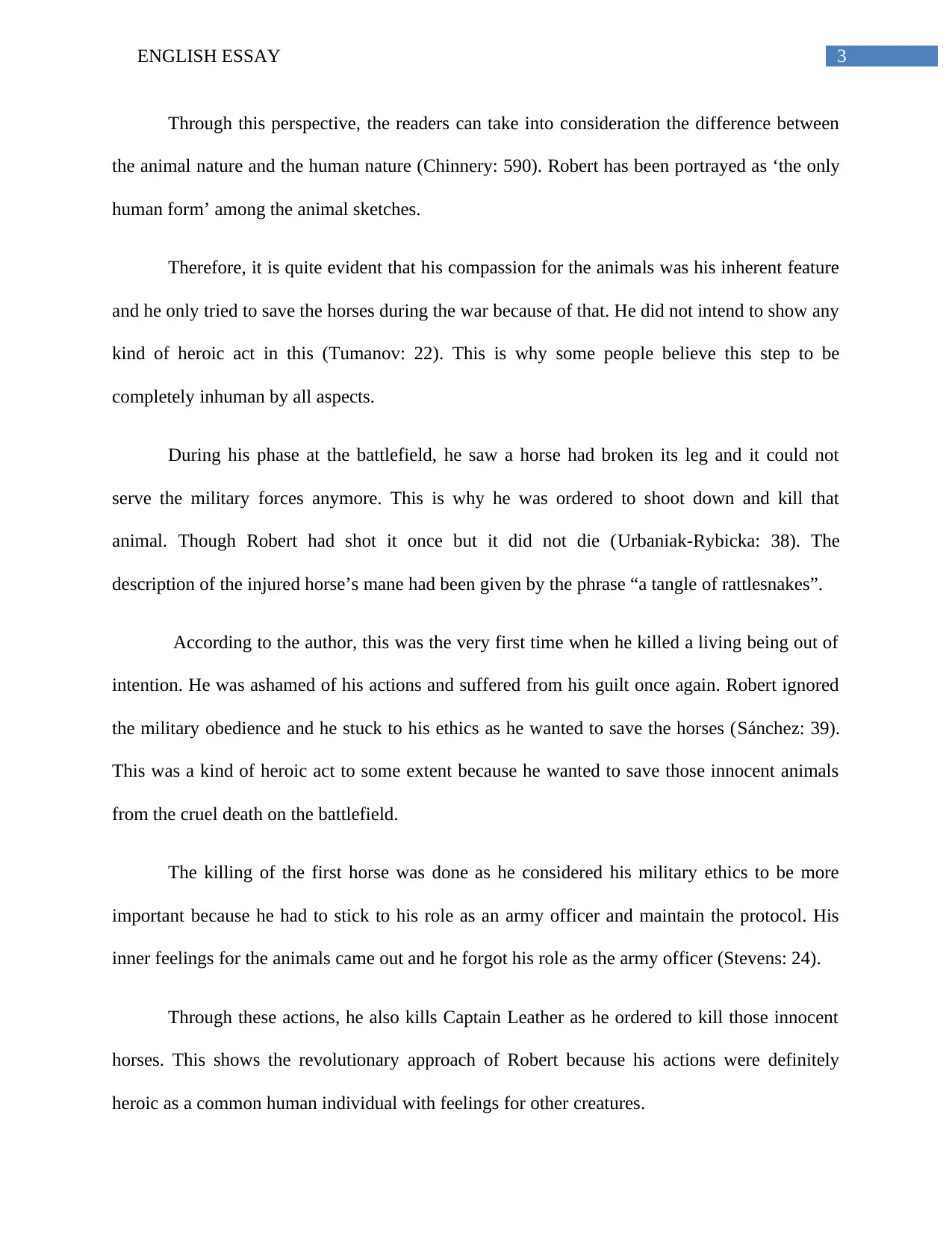
3ENGLISH ESSAY
Through this perspective, the readers can take into consideration the difference between
the animal nature and the human nature (Chinnery: 590). Robert has been portrayed as ‘the only
human form’ among the animal sketches.
Therefore, it is quite evident that his compassion for the animals was his inherent feature
and he only tried to save the horses during the war because of that. He did not intend to show any
kind of heroic act in this (Tumanov: 22). This is why some people believe this step to be
completely inhuman by all aspects.
During his phase at the battlefield, he saw a horse had broken its leg and it could not
serve the military forces anymore. This is why he was ordered to shoot down and kill that
animal. Though Robert had shot it once but it did not die (Urbaniak-Rybicka: 38). The
description of the injured horse’s mane had been given by the phrase “a tangle of rattlesnakes”.
According to the author, this was the very first time when he killed a living being out of
intention. He was ashamed of his actions and suffered from his guilt once again. Robert ignored
the military obedience and he stuck to his ethics as he wanted to save the horses (Sánchez: 39).
This was a kind of heroic act to some extent because he wanted to save those innocent animals
from the cruel death on the battlefield.
The killing of the first horse was done as he considered his military ethics to be more
important because he had to stick to his role as an army officer and maintain the protocol. His
inner feelings for the animals came out and he forgot his role as the army officer (Stevens: 24).
Through these actions, he also kills Captain Leather as he ordered to kill those innocent
horses. This shows the revolutionary approach of Robert because his actions were definitely
heroic as a common human individual with feelings for other creatures.
Through this perspective, the readers can take into consideration the difference between
the animal nature and the human nature (Chinnery: 590). Robert has been portrayed as ‘the only
human form’ among the animal sketches.
Therefore, it is quite evident that his compassion for the animals was his inherent feature
and he only tried to save the horses during the war because of that. He did not intend to show any
kind of heroic act in this (Tumanov: 22). This is why some people believe this step to be
completely inhuman by all aspects.
During his phase at the battlefield, he saw a horse had broken its leg and it could not
serve the military forces anymore. This is why he was ordered to shoot down and kill that
animal. Though Robert had shot it once but it did not die (Urbaniak-Rybicka: 38). The
description of the injured horse’s mane had been given by the phrase “a tangle of rattlesnakes”.
According to the author, this was the very first time when he killed a living being out of
intention. He was ashamed of his actions and suffered from his guilt once again. Robert ignored
the military obedience and he stuck to his ethics as he wanted to save the horses (Sánchez: 39).
This was a kind of heroic act to some extent because he wanted to save those innocent animals
from the cruel death on the battlefield.
The killing of the first horse was done as he considered his military ethics to be more
important because he had to stick to his role as an army officer and maintain the protocol. His
inner feelings for the animals came out and he forgot his role as the army officer (Stevens: 24).
Through these actions, he also kills Captain Leather as he ordered to kill those innocent
horses. This shows the revolutionary approach of Robert because his actions were definitely
heroic as a common human individual with feelings for other creatures.
Paraphrase This Document
Need a fresh take? Get an instant paraphrase of this document with our AI Paraphraser
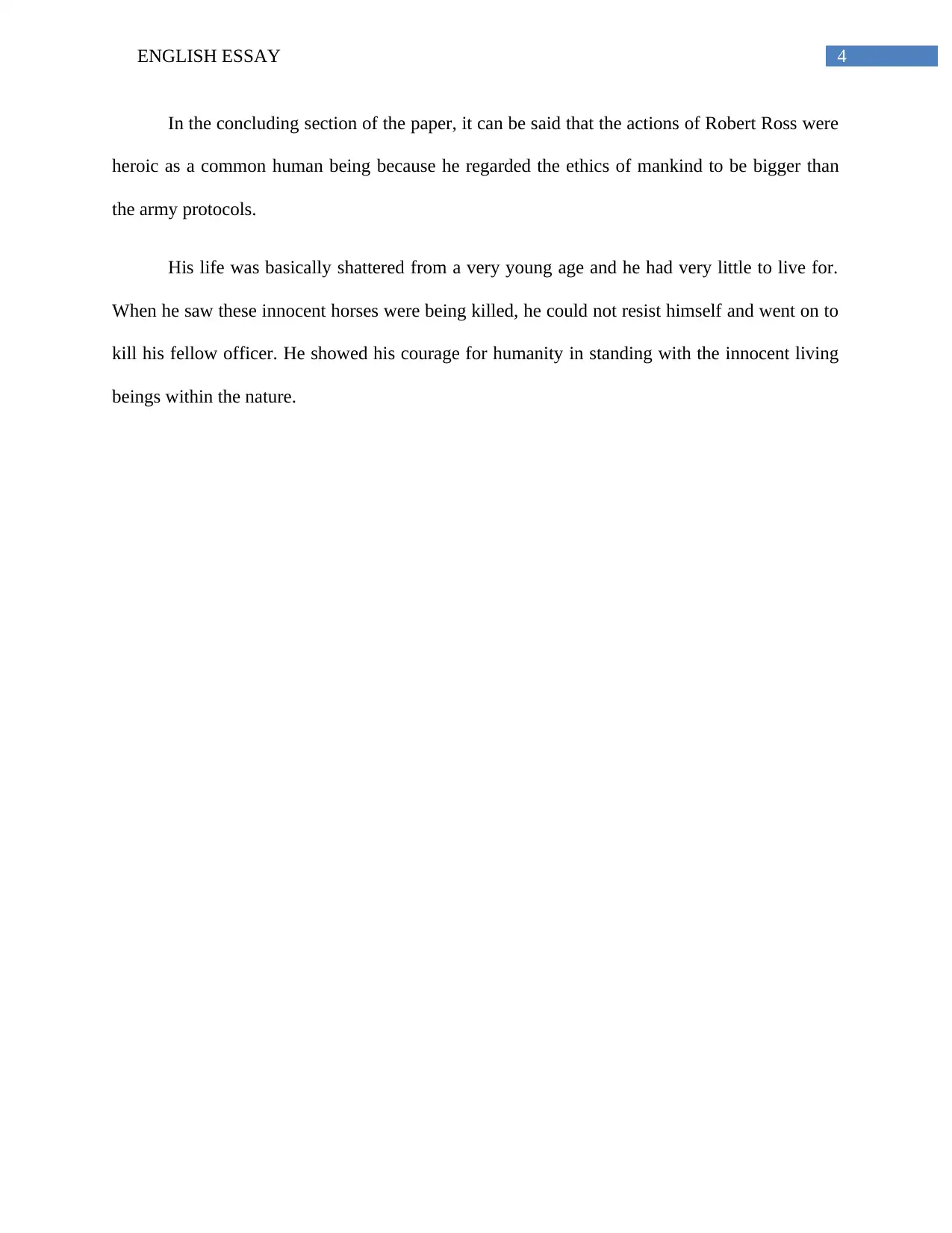
4ENGLISH ESSAY
In the concluding section of the paper, it can be said that the actions of Robert Ross were
heroic as a common human being because he regarded the ethics of mankind to be bigger than
the army protocols.
His life was basically shattered from a very young age and he had very little to live for.
When he saw these innocent horses were being killed, he could not resist himself and went on to
kill his fellow officer. He showed his courage for humanity in standing with the innocent living
beings within the nature.
In the concluding section of the paper, it can be said that the actions of Robert Ross were
heroic as a common human being because he regarded the ethics of mankind to be bigger than
the army protocols.
His life was basically shattered from a very young age and he had very little to live for.
When he saw these innocent horses were being killed, he could not resist himself and went on to
kill his fellow officer. He showed his courage for humanity in standing with the innocent living
beings within the nature.
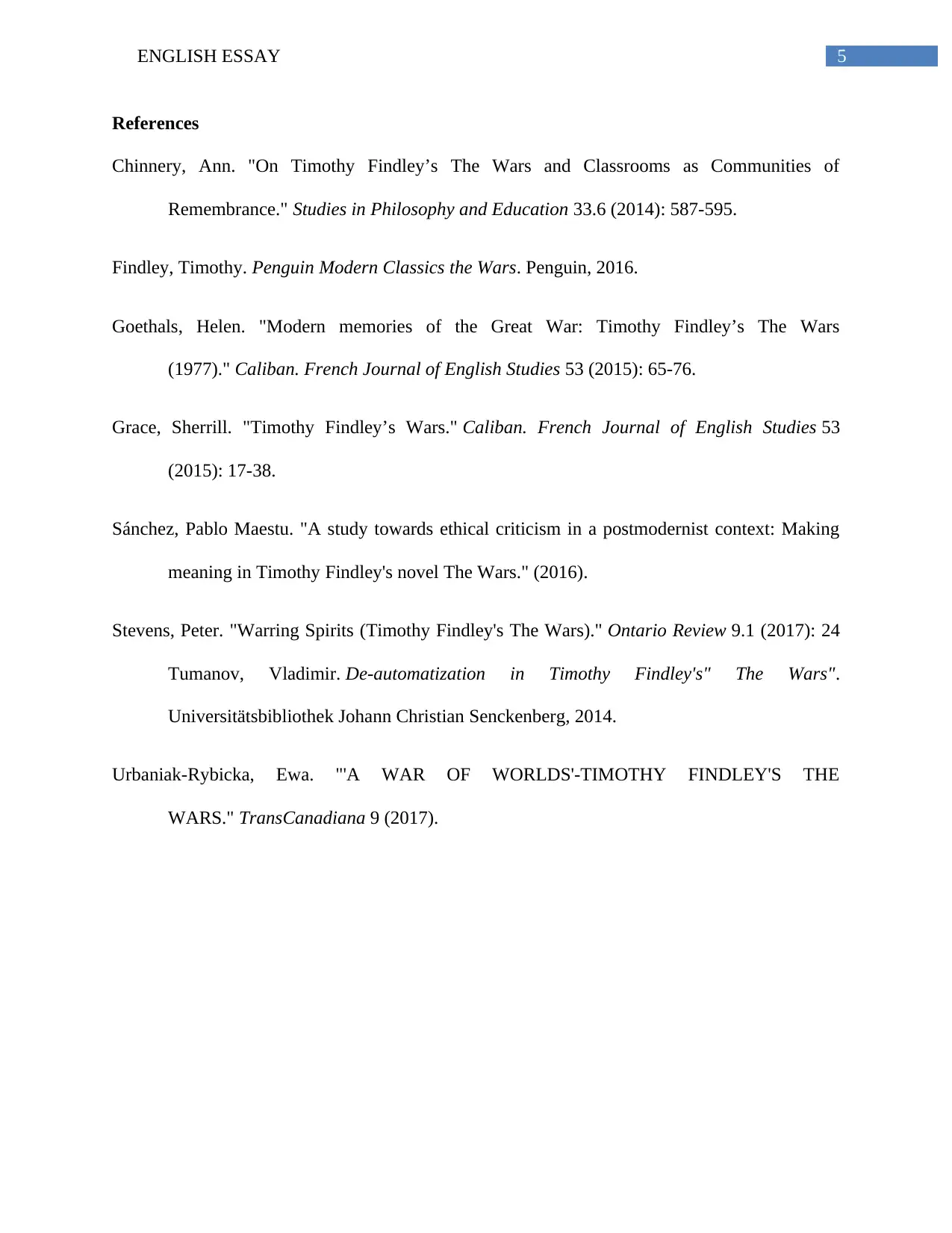
5ENGLISH ESSAY
References
Chinnery, Ann. "On Timothy Findley’s The Wars and Classrooms as Communities of
Remembrance." Studies in Philosophy and Education 33.6 (2014): 587-595.
Findley, Timothy. Penguin Modern Classics the Wars. Penguin, 2016.
Goethals, Helen. "Modern memories of the Great War: Timothy Findley’s The Wars
(1977)." Caliban. French Journal of English Studies 53 (2015): 65-76.
Grace, Sherrill. "Timothy Findley’s Wars." Caliban. French Journal of English Studies 53
(2015): 17-38.
Sánchez, Pablo Maestu. "A study towards ethical criticism in a postmodernist context: Making
meaning in Timothy Findley's novel The Wars." (2016).
Stevens, Peter. "Warring Spirits (Timothy Findley's The Wars)." Ontario Review 9.1 (2017): 24
Tumanov, Vladimir. De-automatization in Timothy Findley's" The Wars".
Universitätsbibliothek Johann Christian Senckenberg, 2014.
Urbaniak-Rybicka, Ewa. "'A WAR OF WORLDS'-TIMOTHY FINDLEY'S THE
WARS." TransCanadiana 9 (2017).
References
Chinnery, Ann. "On Timothy Findley’s The Wars and Classrooms as Communities of
Remembrance." Studies in Philosophy and Education 33.6 (2014): 587-595.
Findley, Timothy. Penguin Modern Classics the Wars. Penguin, 2016.
Goethals, Helen. "Modern memories of the Great War: Timothy Findley’s The Wars
(1977)." Caliban. French Journal of English Studies 53 (2015): 65-76.
Grace, Sherrill. "Timothy Findley’s Wars." Caliban. French Journal of English Studies 53
(2015): 17-38.
Sánchez, Pablo Maestu. "A study towards ethical criticism in a postmodernist context: Making
meaning in Timothy Findley's novel The Wars." (2016).
Stevens, Peter. "Warring Spirits (Timothy Findley's The Wars)." Ontario Review 9.1 (2017): 24
Tumanov, Vladimir. De-automatization in Timothy Findley's" The Wars".
Universitätsbibliothek Johann Christian Senckenberg, 2014.
Urbaniak-Rybicka, Ewa. "'A WAR OF WORLDS'-TIMOTHY FINDLEY'S THE
WARS." TransCanadiana 9 (2017).
⊘ This is a preview!⊘
Do you want full access?
Subscribe today to unlock all pages.

Trusted by 1+ million students worldwide
1 out of 6
Related Documents
Your All-in-One AI-Powered Toolkit for Academic Success.
+13062052269
info@desklib.com
Available 24*7 on WhatsApp / Email
![[object Object]](/_next/static/media/star-bottom.7253800d.svg)
Unlock your academic potential
Copyright © 2020–2025 A2Z Services. All Rights Reserved. Developed and managed by ZUCOL.



